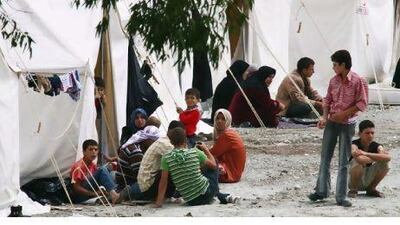DAMASCUS // An anticipated military assault on Jisr al Shughour began yesterday with army units coming under sniper fire as they approached the entrance to the northern border town, according to Syrian officials.
Video: Syrian refugee numbers grow
Last Updated: June 12, 2011 UAE
Increasing numbers of Syrians flee to Turkey as more reports emerge of tanks storming another town overnight
A force of thousands of soldiers, backed by tanks and helicopters, has been operating in the area for days, staging what appeared to have been preliminary raids in surrounding villages, before moving into the town itself yesterday.
Many of its 40,000-plus residents have already fled, about 4,500 of them crossing into Turkey as refugees, amid widespread fears a bloody crackdown is imminent.
Damascus has been promising a powerful military response since last Monday. State-run media claimed last week that 120 security personnel were "massacred" in Jisr al Shughour by insurgents.
Syrian authorities say they are facing an uprising by Islamist militants, which they say has already necessitated army operations across the country, including Deraa, Homs, Hama as well as suburbs around the capital.
That narrative has been dismissed by Syrian opposition activists, human rights monitors, aid agencies and the United Nations. Critics have accused Damascus of violently suppressing a popular, and overwhelmingly peaceful, democratic uprising.
Turkey, a major Syrian ally, has also heavily criticised its neighbour for "savagery" against its own people.
A dissident in Damascus said the army had been forced to delay its operations on Jisr al Shughour because it knew it would face armed resistance.
"It is not militant Islamic groups, as the government says, but people who have had family members killed by the security services so some of them will fight," he said. "It is a tough area and some of the people there will want to get revenge."
Activists have urged all anti-government protesters to remain unarmed. They said taking up weapons would play into the authorities' hands and only result in a futile bloodbath.
According to dissidents, security services killed dozens of civilians at a protest in Jisr al Shughour a week ago. The reports surfaced a few days before the 120 security personnel were reportedly killed.
Syrian refugees who fled into Turkey, as well as testimonies collected by civil rights groups, suggested that the members of security units who died were gunned down by their own side after refusing orders to open fire on civilians.
The authorities have explained away various eyewitness reports of security personnel fighting against each other. They have said militants in Jisr al Shughour obtained army uniforms and government cars and then attacked the police in a deliberate ploy to incite sedition and further rebellion.
Most of the rank-and-file soldiers in the Syrian army are poorly trained and poorly equipped conscripts drawn from the working-class majority. There are indications these soldiers have no appetite to act as enforcers for the government against civilian protesters.
Security operations have therefore been in large part left to elite ultra-loyalist army units - the 4th Division and the Republican Guard - and the various branches of the secret police.
The situation in Jisr al Shughour has evolved in a similar fashion to a previous uprising and subsequent military crackdown in Deraa, 100km south of Damascus, where Syria's revolt began in March.
In response to growing protests, the Syrian military was sent in to crush dissent. In Deraa, as in Jisr al Shughour, the government insists "terrorised" residents requested help from the military to save them from "armed gangs".
Reports of army desertions and clashes between loyalist troops and those refusing orders also surfaced during the Deraa operations.
Rights groups say more than 400 civilians were killed in Deraa, but there has been no independent investigation into what happened there. A UN human-rights assessment team has been denied access by the Syrian authorities.
International condemnation of Syria has been growing. The European Union and United States have imposed sanctions against senior regime officials and are supporting efforts to pass a UN Security Council resolution condemning violence that is widely believed to have killed more than 1,000 protesters.
Syria has said passing any resolution would "aid terrorists", and is banking on ally Russia to veto the proposal.
It is the hardening stance by Turkey that has touched a raw nerve in Syria. The two countries are key allies and their respective leaders, Prime Minister Recep Tayyip Erdogan and President Bashar al Assad, are friends.
That friendship appears to have frayed. Mr Erdogan criticised Mr Assad on Thursday for failing to push through meaningful political reforms and for unleashing "inhumane" levels of violence against protesters.
An anti-Turkey backlash is now underway in Syria, with state-controlled media accusing Ankara of trying to resurrect the Ottoman Empire and re-establish control over the Middle East.
Hard-line supporters of Mr al Assad see Turkey's turnabout as part of a wider conspiracy involving Washington, Brussels and Syria's decades-old enemy, Israel.
"The West wants to put the region under Turkish control, like in the Ottoman days," said one pro-regime figure in Damascus. "Turkey is a Nato member and embodies a safe kind of Islam for the West, so they have made a deal to give everything to Ankara."
The official maintained that Damascus was far from alone and remained a powerful regional political player.
"The plot will not work in the end," he said. "Syria still has some cards. It has Iran and Hizbollah."
Syria and Iran have been allies since the late 1970s. Both support Hizbollah, the Lebanese Islamist resistance movement. Washington has accused Tehran of helping suppress anti-government demonstrations in Syria. Opposition activists have claimed that highly trained Hizbollah fighters have been helping Damascus put down the uprising.

